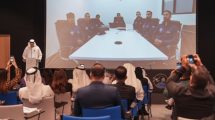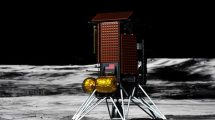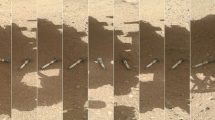 Mohammed Bin Rashid Space Centre (MBRSC) has signed a contract with Japan’s ispace, inc. (ispace), under which the latter will provide payload delivery services for the Emirates Lunar Mission.
Mohammed Bin Rashid Space Centre (MBRSC) has signed a contract with Japan’s ispace, inc. (ispace), under which the latter will provide payload delivery services for the Emirates Lunar Mission.
Under this agreement, ispace becomes a key strategic and implementation partner to MBRSC on the Emirates Lunar Mission, the first of its kind from the Arab world.
The ‘Rashid’ rover will be transported to the Moon on ispace’s lunar lander during the company’s ‘Mission 1’ in 2022 as part of its commercial programme known as ‘HAKUTO-R’. The Japanese lunar exploration company will deliver the ‘Rashid’ rover to the Moon, provide wired communication and power during the cruise phase, and engage in wireless communication on the lunar surface.
The project is a key part of the UAE’s space exploration strategy, which is centred around building new knowledge capabilities, inspiring future generations to pursue space science and research, and fostering global collaboration. Upon the execution of the mission, the UAE and Japan, together, are anticipated to be the next two nations to successfully put a spacecraft on the lunar surface, following the United States, Russia and China.
After a thorough consideration of competing lunar payload delivery service providers, MBRSC selected ispace based on the company’s technological credibility.
Speaking about the agreement, Yousuf Hamad AlShaibani, Director-General, MBRSC, said: “MBRSC’s commitment towards space research and development has garnered the attention of the world through our various projects. We are now leveraging our advanced scientific and technological hub by partnering with international entities that will aid in creating a new space economy landscape in the country. Our mission through scientific endeavours such as the Emirates Lunar Mission is to keep the UAE flag flying high and be at the forefront of countries contributing to scientific achievements that will change the face of humanity.”
Adnan AlRais, Mars 2117 Programme Manager and Senior Director Remote Sensing Department, MBRSC, added: “Our association with Japan’s ispace is in line with the MBRSC’s ambitious vision of growing a vibrant and sustainable space ecosystem through collaborations and partnerships. The Emirates Lunar Mission represents a milestone in the UAE’s space sector as the mission will contribute towards providing valuable data and information relating to the Moon that will serve the global scientific community as well as test capabilities that would be crucial for manned missions to Mars.”
Takeshi Hakamada, Founder & CEO, ispace, commented: “We are honoured that MBRSC has entrusted ispace’s lunar payload transportation service to play a key role in carrying out this historic moment for the UAE. The world will be watching as our commercial lander carries the ‘Rashid’ rover to the Moon. We’re pleased to advance collaboration between the UAE and Japan in space exploration, as well as to inspire more collaborations for lunar exploration between the public and commercial sector around the world.”
Dr John Walker, Chief Rover Architect, ispace, said: “As the frequency and volume of small rovers traversing the lunar landscape is expected to increase in the coming years, we’re pleased to bring MBRSC’s ‘Rashid’ rover to the Moon to kickstart the next phase of lunar surface exploration.”
As governments and companies around the world set their sights on the Moon, fostering public-private partnerships such as this can further lunar science, drive forward innovations, and foster the growth of the burgeoning commercial lunar exploration market. Through such endeavours, the global economic sphere can be expanded, while also ensuring a sustainable future for humanity.
The Emirates Lunar Mission is one of the initiatives under the Mars 2117 Programme, which aims to build a human colony on Mars, and is funded by the ICT Fund under the Telecommunications Regulatory Authority (TRA).












Add Comment